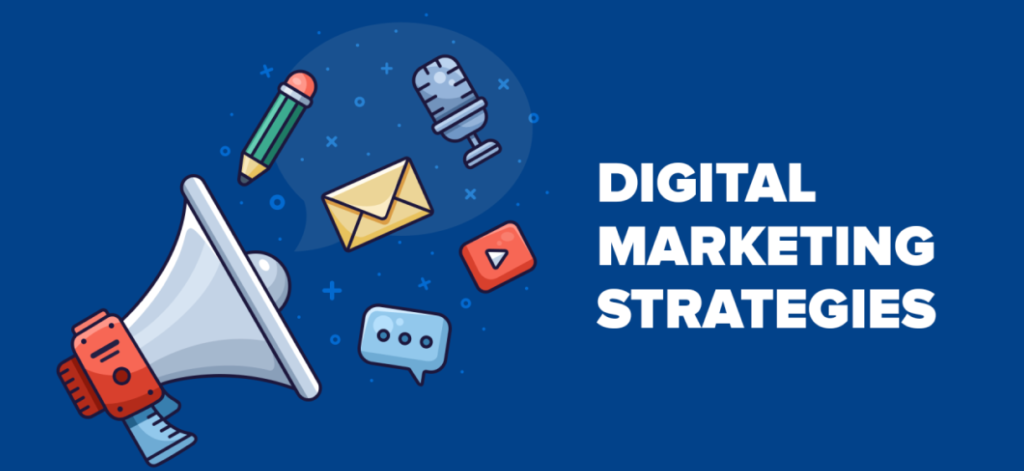Introduction
In today’s digital era, marketing has evolved beyond traditional channels like print and television. Digital marketing has become a dominant force, helping businesses connect with their target audience in more effective and measurable ways. But what exactly is digital marketing, and why is it crucial for businesses today?
This blog explores the definition, importance, types, and benefits of digital marketing, along with the latest trends and strategies to succeed in the digital space.
What Is Digital Marketing?
Digital marketing refers to all marketing efforts that use digital channels such as the internet, social media, search engines, email, and mobile applications to reach consumers. It involves leveraging online platforms to promote products, build brand awareness, and drive customer engagement. Unlike traditional marketing, digital marketing allows businesses to track their marketing efforts in real-time and make data-driven decisions.
Importance of Digital Marketing
Digital marketing is essential for businesses of all sizes, from small startups to multinational corporations. Here’s why it matters:
- Wider Reach – The internet allows businesses to reach a global audience and tap into new markets effortlessly.
- Cost-Effective – Digital marketing is more affordable than traditional marketing, making it accessible for businesses with different budgets.
- Measurable Results – Tools like Google Analytics and social media insights help track performance and optimize campaigns.
- Targeted Marketing – Advanced data analytics enable businesses to target specific demographics, behaviors, and interests.
- Engagement and Interaction – Digital marketing facilitates direct communication with customers through social media, email, and live chats.
- Competitive Advantage – Businesses that leverage digital marketing effectively can stay ahead of competitors who rely solely on traditional methods.
Types of Digital Marketing
There are several components of digital marketing, each with its unique approach and benefits:
1. Search Engine Optimization (SEO)
SEO is the process of optimizing a website to rank higher in search engine results. It involves:
- Keyword research
- On-page and off-page optimization
- Technical SEO improvements
- Link building
- Content marketing
A well-executed SEO strategy increases organic traffic, improves visibility, and enhances credibility.
2. Pay-Per-Click Advertising (PPC)
PPC advertising allows businesses to place ads on search engines and social media platforms. Advertisers pay a fee each time someone clicks on their ad. Popular PPC platforms include:
- Google Ads
- Facebook Ads
- LinkedIn Ads
- Instagram Ads
PPC is highly effective in driving targeted traffic and generating leads.
3. Social Media Marketing (SMM)
Social media marketing involves promoting content on platforms like Facebook, Instagram, Twitter, LinkedIn, and TikTok. It helps businesses:
- Build brand awareness
- Engage with customers
- Drive website traffic
- Generate leads and sales
4. Content Marketing
Content marketing focuses on creating valuable and relevant content to attract and engage audiences. Popular content types include:
- Blog posts
- Videos
- Infographics
- E-books
- Podcasts
A strong content marketing strategy builds trust and establishes authority in the industry.
5. Email Marketing
Email marketing involves sending personalized messages to a targeted audience. It is one of the most cost-effective methods for nurturing leads and retaining customers. Successful email marketing includes:
- Personalized messaging
- Engaging subject lines
- Automated email sequences
- A/B testing
6. Influencer Marketing
Influencer marketing leverages the popularity of social media influencers to promote products and services. It works because influencers have a dedicated following that trusts their recommendations.
7. Affiliate Marketing
Affiliate marketing is a performance-based strategy where businesses reward affiliates for driving traffic or sales. Affiliates earn a commission for each successful conversion.
8. Mobile Marketing
With the rise of mobile usage, businesses use mobile marketing strategies such as:
- SMS marketing
- Mobile apps
- In-app advertising
- Location-based marketing
9. Video Marketing
Video marketing is gaining popularity due to platforms like YouTube, Instagram Reels, and TikTok. Engaging video content helps businesses:
- Showcase products
- Explain services
- Build emotional connections
10. Marketing Automation
Marketing automation uses software tools to streamline marketing activities like email campaigns, social media scheduling, and lead nurturing. It improves efficiency and enhances personalization.
Benefits of Digital Marketing
Digital marketing offers numerous advantages for businesses looking to grow their online presence:
- Global Reach – Expand your audience beyond geographical boundaries.
- Cost-Effective – Lower costs compared to traditional advertising.
- Better Engagement – Directly interact with customers and build relationships.
- Data-Driven Decisions – Use analytics to refine marketing strategies.
- Increased Conversion Rates – Targeted marketing leads to higher conversions.
- Brand Authority – High-quality content positions businesses as industry leaders.
Latest Digital Marketing Trends in 2024
The digital marketing landscape continues to evolve. Here are the latest trends to watch:
- Artificial Intelligence (AI) in Marketing – AI is revolutionizing customer interactions, chatbots, and predictive analytics.
- Voice Search Optimization – With the rise of voice assistants like Alexa and Siri, optimizing for voice search is crucial.
- Interactive Content – Quizzes, polls, and augmented reality enhance engagement.
- Personalization – Hyper-personalized marketing campaigns improve customer experiences.
- Short-Form Videos – Platforms like TikTok and Instagram Reels dominate social media marketing.
- Sustainability Marketing – Consumers prefer brands that focus on sustainability and social responsibility.
How to Develop a Digital Marketing Strategy
To succeed in digital marketing, businesses need a well-structured strategy. Follow these steps:
- Define Goals – Identify what you want to achieve (brand awareness, lead generation, sales, etc.).
- Know Your Audience – Conduct market research to understand customer demographics and behaviors.
- Choose the Right Channels – Select digital marketing platforms that align with your audience.
- Create High-Quality Content – Develop engaging and informative content tailored to your audience.
- Optimize for SEO – Improve website performance and rankings through SEO best practices.
- Leverage Data Analytics – Monitor campaign performance and adjust strategies based on insights.
- Engage on Social Media – Consistently interact with your audience through comments, messages, and live sessions.
- Run Paid Campaigns – Invest in PPC and social media ads to expand reach and boost conversions.
- Test and Improve – Regularly A/B test content, ads, and marketing strategies to optimize results.
Conclusion
Digital marketing is an ever-evolving field that offers endless opportunities for businesses to grow and succeed. By leveraging the right digital marketing strategies, businesses can reach a broader audience, engage customers effectively, and drive significant revenue growth.
Whether you’re a small business owner, a marketing professional, or a startup founder, embracing digital marketing is crucial in today’s competitive landscape. Start implementing these strategies today and stay ahead of the curve!
Need help with your digital marketing strategy? Contact us today to take your business to the next level!


